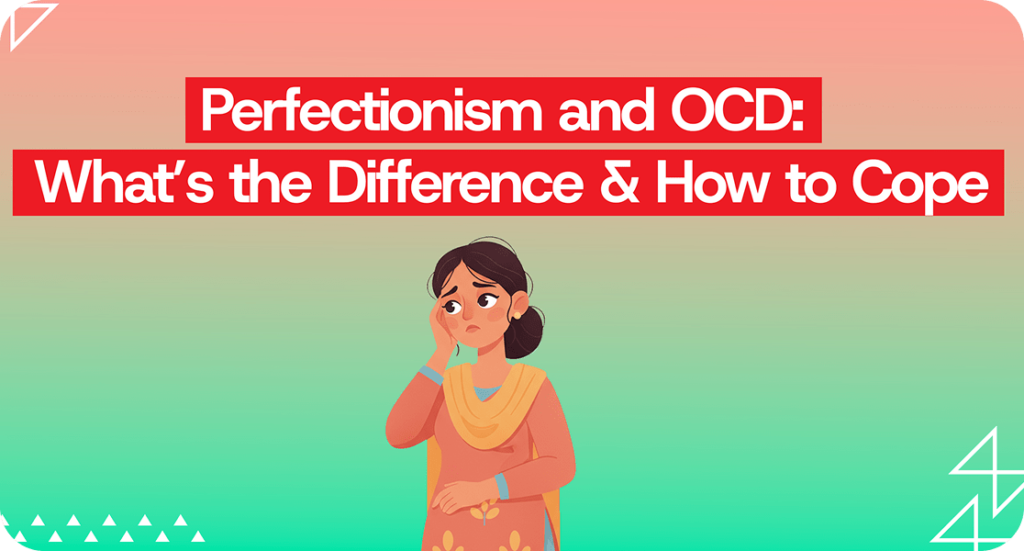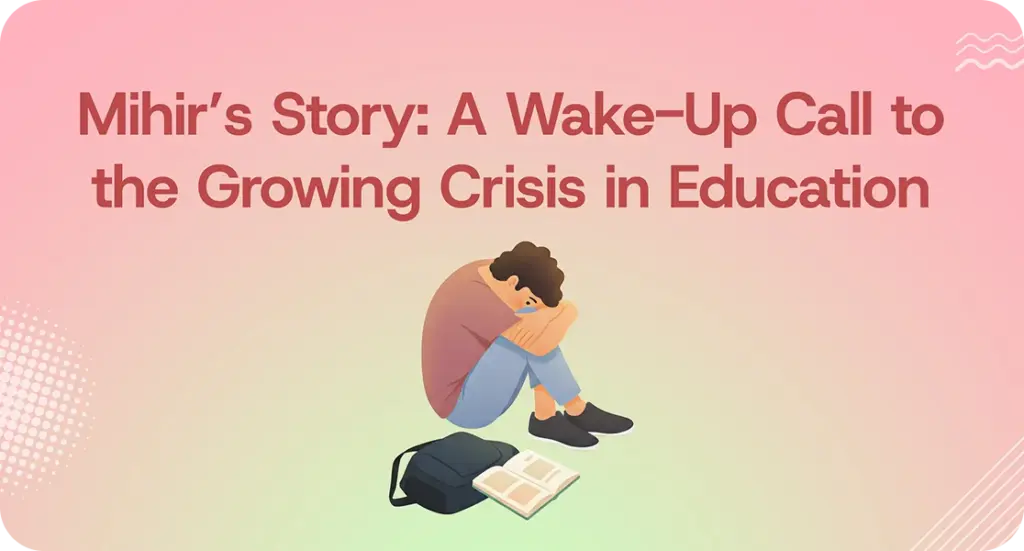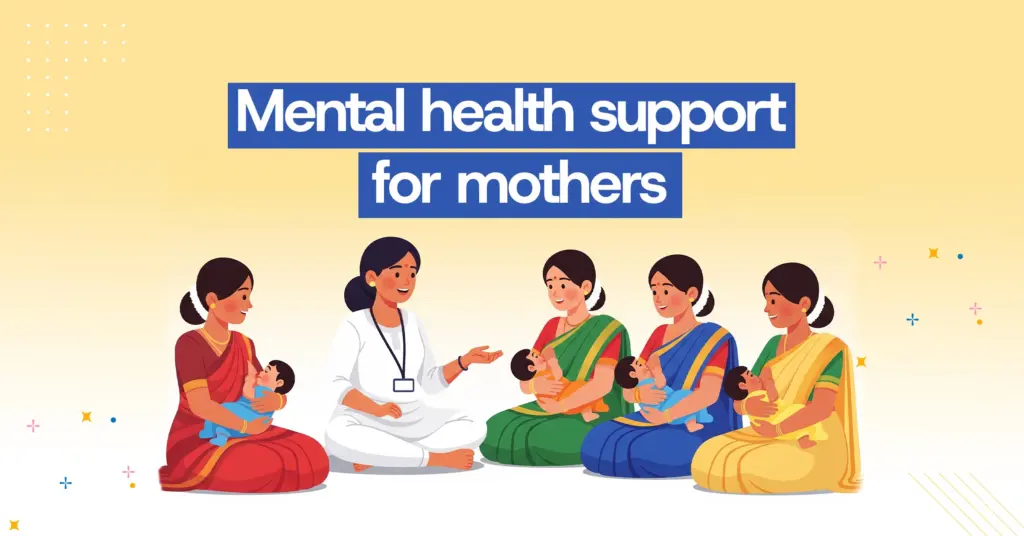
Postpartum therapy for new moms in Kerala is still an overlooked topic, despite the state’s relatively high female population. In Kerala, where women outnumber men and generally live longer, mental health — especially postpartum depression treatment Kerala mental health — remains under-researched and under-discussed. Many mothers face stress, anxiety, and emotional struggles after childbirth, yet lack access to dedicated, culturally aware support systems. Generally, women in Kerala have a longer life expectancy than men, but they are more prone to health problems, especially mental health issues. Various physical, social, and psychological factors contribute to women’s mental health problems. Due to differences in chromosomal structure, women are more susceptible to X-chromosome-related disorders. Additionally, hormonal fluctuations during menstruation, pregnancy, lactation, and menopause can lead to various mental health conditions. The differences in body structure and hormonal changes, particularly the fluctuations in estrogen and progesterone levels, can cause diverse mental health support for mothers Kerala.
There are often extensive discussions in Kerala about child development, the importance of family, and parenting. Discussions also take place about how a mother’s mental health affects her child’s health and the importance of a healthy mother-child bond. The Indian government’s ‘First 1000 Days’ initiative is an awareness program that emphasizes the importance of childcare and parenting, focusing on planned pregnancy, nutrition, and mothers’ physical and mental health. However, the reality is that there is limited discussion about the need to improve mothers’ mental health and the mental stress they experience.
Often, we don’t have in-depth discussions about what needs to be done to improve mothers’ mental health. This is a topic that warrants extensive debate and careful consideration. Society’s approach to women’s mental health issues is similar to its approach to other women’s issues. As a result, problems experienced by mothers often go unrecognized. Providing proper counseling and mental health support can help resolve these issues effectively.
Read more to know more…
Malayali Mothers in Early Motherhood
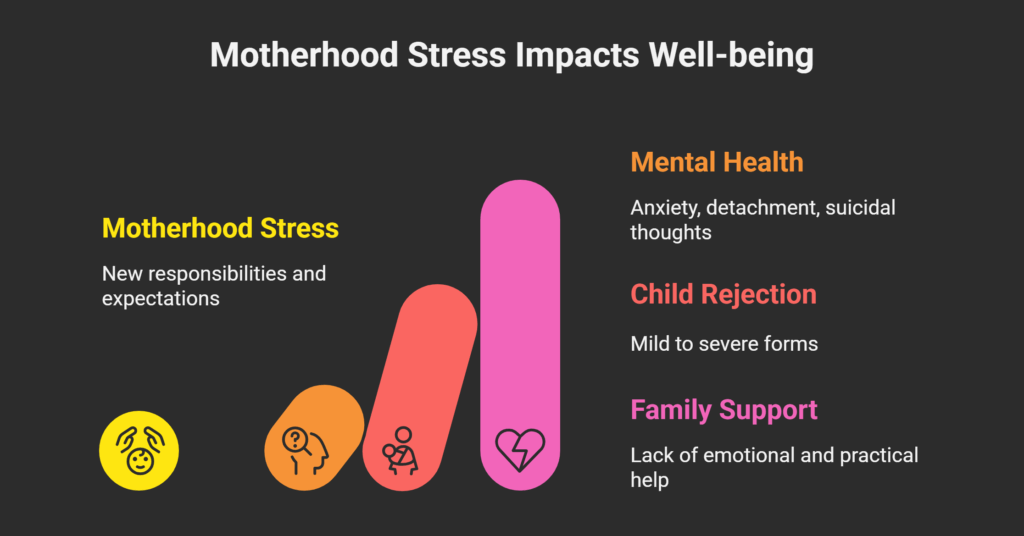
Becoming a mother is often described as a joyful and life-changing experience for women, and this is indeed true. However, we often remain unaware of the struggles many new mothers face. New mothers may deviate from their usual personality and behavior, becoming detached from their child and even themselves. These changes in women often go unaddressed. Some news reports of mothers harming their children may be linked to the mental stress they experience.
Various factors contribute to the challenges faced by new mothers:
- Lack of proper family and emotional support, hormonal changes, societal expectations, pressure to be a ‘good mother,’ new responsibilities, childcare issues, work-life balance confusion.
- Societal pressure can all push mothers into significant stress. In such situations, it’s essential to understand their circumstances, consider their mental and physical well-being, and establish a proper support system.
- Emotional support is crucial in these situations. The early days of motherhood are critical in establishing a bond between mother and child.
- Mothers may face various challenges, from mild anxiety and breastfeeding concerns to severe forms of child rejection.
- In some cases, this can even lead to suicidal thoughts. Seeking proper counseling and therapy is vital in addressing these issues.
Malayali therapists and online counselling sessions can provide the necessary support to cope with stress and anxiety.
postpartum counselling in Malayalam for New Moms in Kerala: Understanding the Disorders
It refers to a range of physical, emotional, and mental health challenges that some women experience after childbirth. These disorders can vary in severity and impact a new mother’s ability to care for herself and her baby. Common types of postpartum disorders include:
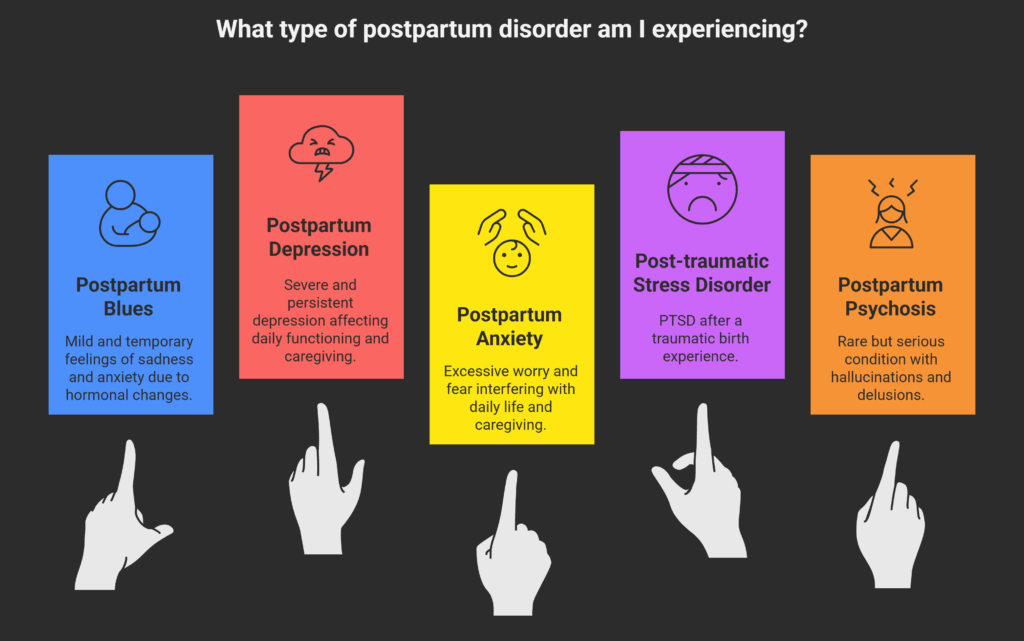
- Postpartum blues (Baby blues): Mild and temporary feelings of sadness, anxiety, and mood swings, often due to hormonal changes.
- postpartum depression treatment Kerala (PPD): A more severe and persistent form of depression that affects a mother’s ability to function and care for her baby.
- Postpartum anxiety treatment Kerala: Excessive worry, fear, or anxiety that interferes with daily life and caregiving.
- Post-traumatic stress disorder (PTSD): In some cases, women may develop PTSD after a traumatic birth experience.
- Postpartum psychosis: A rare but serious condition characterized by hallucinations, delusions, or severe mood disturbances.
Symptoms of postpartum disorders can include:
- Mood swings
- Sadness or hopelessness
- Anxiety or worry
- Difficulty bonding with the baby
- Changes in appetite or sleep
- Feelings of guilt or inadequacy
If you’re experiencing any of these symptoms, it’s essential to seek support from a healthcare provider, online therapist, or counselor. With proper treatment and support, women can recover from postpartum disorders and enjoy a healthy, fulfilling experience of motherhood.
Common Mental Health Issues After Childbirth in Kerala
New mothers may navigate various types of mental health issues, influenced by cultural, physical, and social factors.
1. Postpartum depression treatment Kerala
Postpartum blues and baby blues are common in new mothers, typically manifesting as mild and moderate mood swings, stress, and anxiety. However, postpartum depression in malayali womens refers to a more severe condition. Postpartum disorders can begin within one or two months after childbirth.
- According to a 2015 study published in the Journal of Psychiatry, the prevalence of postpartum depression in India ranges from 15% to 20%.
- Another study published in the Journal of Obstetrics and Gynecology of India in 2017 found the prevalence to be between 9.5% and 22%.
- Symptoms include self-blame, helplessness, feelings of failure, and loss of interest. Mothers may also experience delusions, such as believing the child is not theirs or has missing limbs. In severe cases, it can lead to suicidal thoughts or even infanticide, emphasizing the need for close monitoring.
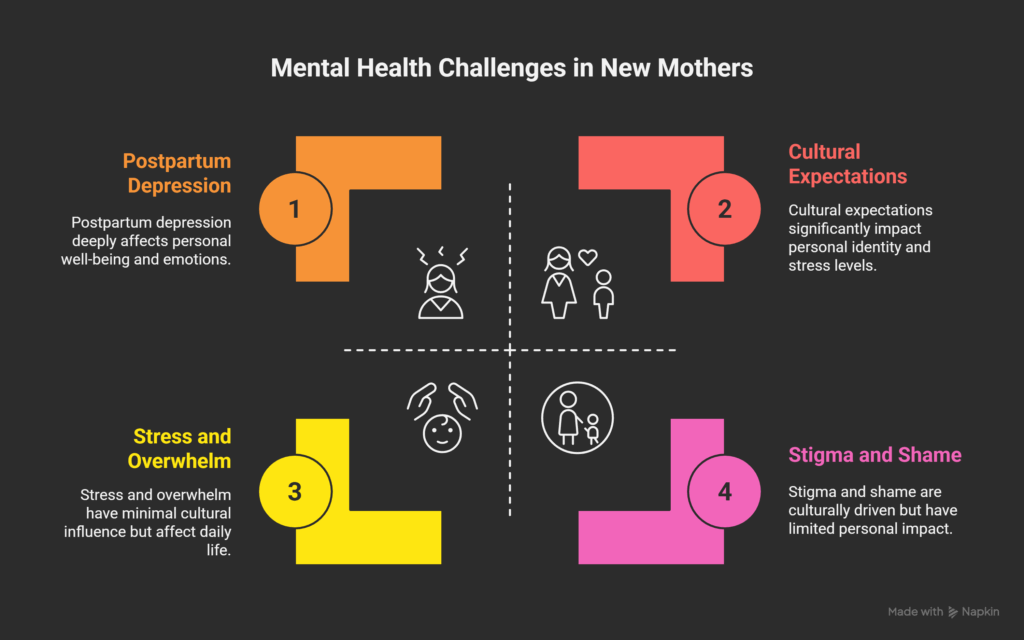
Counseling and therapy can effectively address these issues, and seeking support from licensed Malayali mental health counselors is recommended. Online Malayali therapy sessions and licensed psychologists in kerala are available to provide support in the client’s native language. Notably, postpartum depression can also affect men.
2. Stress and Overwhelm
New mothers often experience significant stress and tension due to childcare issues, household responsibilities, and personal obligations. In such situations, counseling to reduce stress and tension can help make motherhood more enjoyable.
3. Identity Transformation
Becoming a parent is said to mark the birth of new roles and identities. The arrival of a new role, identity, and responsibilities can cause confusion and stress. Cultural expectations also play a significant role in shaping these experiences. In such situations, counseling can help alleviate mental stress and support new mothers in navigating these changes.
4. Stigma and Shame
Society often perpetuates stereotypes about women and mothers, expecting them to be perfect and self-sacrificing. These unrealistic expectations can lead to significant stress and pressure on mothers.
The societal expectation of mothers as selfless caregivers can result in feelings of inadequacy, burnout, and stress. Seeking professional help, such as counseling and Malayalam counseling sessions, is essential to address these issues.
5. Cultural Expectations
In Kerala, family and family relationships are highly valued, and there are certain cultural expectations surrounding women’s and mothers’ roles. Mothers are often expected to prioritize family and children over their own needs and desires. This can lead to significant conflict and stress for mothers, who may forget their own happiness and identity in the process.
Need to Talk to Someone?
Book a private online session with a licensed therapist
Malayalam counselling sessions and cultural therapy at oppam can help alleviate these conflicts and reduce stress. Seeking support from Malayali couple therapists and cultural therapy sessions can be beneficial.
6. Lack of Support
As mentioned earlier, motherhood is a period of significant physical and mental changes, influenced by hormonal fluctuations. Mothers may exhibit changes in behavior, mood swings, and emotional vulnerability.
In such situations, criticism and judgment can further exacerbate their mental health issues. What mothers need most is support from their partner and family. It’s essential to understand that these changes are natural and can be addressed with proper treatment. Counseling and therapy sessions can help mothers navigate these challenges. Open discussions about mental health and encouraging conversations can also be beneficial.
7. Career vs. Motherhood
Many mothers experience significant stress due to the conflicting demands of work and motherhood. Despite their desire to balance both fear and discrimination. Many mothers may sacrifice their careers or compromise their professional goals to prioritize childcare, leading to significant conflict and stress.
Counseling and therapy can help mothers build confidence and develop strategies to balance work and motherhood. Malayalam couple therapy sessions and counseling services, including stress management and depression support, can be particularly helpful.
Isolation Abroad: isolation abroad and emotional loneliness in NRI women
It’s essential to discuss the mental health of mothers who have to leave their homeland and culture to go to other countries for work or other reasons. NRI Malayali mothers face numerous challenges, including isolation, the stress of caring for a child without any help, and the difficulties of establishing their identity in a new country.
NRI (Non-Resident Indian) mothers often face unique challenges while living abroad, including:
Emotional Struggles
- Isolation and loneliness: Leaving behind family and friends in India can lead to feelings of isolation and disconnection.
- Cultural adjustment: Adapting to a new culture, language, and customs can be overwhelming and stressful.
- Motherhood in a foreign land: Managing childcare without the support of extended family members can be daunting.
Practical Challenges
- Language barriers: Communication difficulties can hinder daily tasks, social interactions, and access to services.
- Navigating unfamiliar systems: Understanding and navigating healthcare, education, and other systems in a foreign country can be complex.
- Balancing work and family: Managing work-life balance while raising children in a foreign country can be stressful.
In such situations, seeking professional help is the best course of action. For Malayali mothers living abroad, presenting their problems and finding solutions in their language can be a significant challenge. As a result, many may not utilize counseling services.
Feeling Overwhelmed?
You’re Not Alone. Get Support from an
Oppam Therapist Wherever You Are
Oppam Therapist Wherever You Are
To address your difficulties and conflicts and seek solutions, Oppam provides facilities such as Malayali Moms Abroad Therapy and NRI Mothers Online Counselling. As Oppam is the first online system that can be accessed from anywhere in Kerala at any time, NRI women experiencing isolation and emotional loneliness can utilize these online counselling and therapy services. Remember, you are not alone; Oppam is with you.
How to overcome motherhood challenges
Overcoming motherhood challenges requires a combination of self-care, support, and practical strategies. Here are some ways to navigate motherhood challenges:
Self-Care:
- Prioritize rest: Sleep when your baby sleeps, and take breaks when needed.
- Nutrition and exercise: Focus on healthy eating and regular physical activity.
- Mental health: Practice stress-reducing techniques, such as meditation or deep breathing.
Support Systems:
- Partner and family support: Communicate openly with your partner and family members about your needs.
- Friends and community: Connect with other mothers through support groups or social events.
- Online resources: Join online forums or social media groups for mothers.
Practical Strategies:
- Time management: Prioritize tasks, and ask for help when needed.
- Baby care: Learn about baby development, and seek guidance from healthcare professionals.
- Household management: Share responsibilities with your partner or family members.
Emotional Well-being:
- Self-compassion: Be kind to yourself, and acknowledge your efforts as a mother.
- Emotional expression: Share your feelings with your partner, family, or friends.
- Professional help: Seek counseling or therapy if you’re struggling with your mental health.
Building Resilience:
- Flexibility: Be adaptable and adjust to changing circumstances.
- Problem-solving: Develop problem-solving skills to navigate challenges.
- Self-care routines: Establish routines that promote self-care and relaxation.
By prioritizing self-care, building support systems, and developing practical strategies, mothers can better navigate the challenges of motherhood.
Becoming a mother can be a joyful experience, but it can also be accompanied by various stressors. These reactions may be natural, and it’s essential to acknowledge and address them through counseling and therapy. Remember, a happy mother contributes to a healthy child.
Utilize the available resources to support your well-being. You may sometimes feel isolated or neglected by society, but know that you’re not alone.
Through proper counselling and therapy, you can experience a healthy motherhood. For this, you can utilize Oppam’s online Malayalam counselling sessions
Struggling?
Talk to an Oppam Therapist
Get the Support You Deserve Online & Confidential
